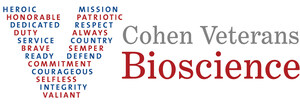Cohen Veterans Bioscience Releases Harris Poll Assessing Awareness of PTSD in U.S. Military Veterans
Large majority of Americans agree that Post-Traumatic Stress Disorder among U.S. military veterans is a significant problem
Majority of Americans surveyed acknowledge U.S government should provide more support and resources to help U.S. military veterans with PTSD
WASHINGTON, April 19, 2018 /PRNewswire-USNewswire/ -- Cohen Veterans Bioscience today announced results of a Harris Poll survey of over 2000 respondents revealing that nearly 9 in 10 Americans (88%) agree that post-traumatic stress disorder (PTSD) is a significant problem among U.S. military veterans. However, only 31 percent of Americans surveyed felt there were enough resources available to help U.S. military veterans with PTSD, with 72 percent of individuals strongly agreeing that the U.S. government should offer additional help to these veterans.
PTSD is a clinically diagnosed disorder that can occur following the experience or the witnessing of life-threatening events such as military combat, natural disasters, terrorist incidents, serious accidents, or physical or sexual assault in adulthood or childhood. Symptoms include flashbacks, nightmares, severe anxiety, uncontrollable intrusive thoughts, and emotional numbing after the event.
Awareness of PTSD as a significant problem was broad, even among individuals not closely affiliated with the U.S. military (89% of respondents who are not veterans or do not have immediate family who are veterans). Americans also see PTSD as a significant problem for veterans, impacting their daily lives including interfering with their ability to hold down a steady job and maintain healthy relationships with family and friends (89%). The majority (87%) of respondents also recognized that U.S. military veterans typically have other brain health problems such as depression, memory problems, difficulty concentrating, and issues with sleep.
"The results of this survey highlight the gap between the broad public awareness of mental health problems within the U.S. military veteran community experiencing trauma and their perception of the lack of resources available to address this significant issue," commented Cohen Veterans Bioscience Chief Medical Officer Allyson Gage, PhD. "Results such as these embolden us to continue our all-hands approach to tackling this important scientific & clinical challenge to ensure that better treatments for trauma-related brain disorders are developed in years, not decades."
Survey Results Summary
Question wording: How much do you agree or disagree with each of the following statements about post-traumatic stress disorder (PTSD)?
| 1. PTSD is a significant problem among U.S. military veterans. |
|
| n= |
2,105 |
| Strongly/Somewhat Agree (NET) |
88% |
| Strongly agree |
66% |
| Somewhat agree |
22% |
| Strongly/Somewhat Disagree (NET) |
4% |
| Somewhat disagree |
2% |
| Strongly disagree |
2% |
| Not at all sure |
7% |
| 2. The U.S. government should do more to help U.S. military veterans with PTSD. |
|
| n= |
2,105 |
| Strongly/Somewhat Agree (NET) |
89% |
| Strongly agree |
72% |
| Somewhat agree |
16% |
| Strongly/Somewhat Disagree (NET) |
4% |
| Somewhat disagree |
2% |
| Strongly disagree |
2% |
| Not at all sure |
7% |
| 3. There are enough resources available to help U.S. military veterans with PTSD. |
|
| n= |
2,105 |
| Strongly/Somewhat Agree (NET) |
31% |
| Strongly agree |
15% |
| Somewhat agree |
15% |
| Strongly/Somewhat Disagree (NET) |
56% |
| Somewhat disagree |
29% |
| Strongly disagree |
27% |
| Not at all sure |
14% |
| 4. Military-related PTSD is not the only health problem U.S. military veterans face (i.e., they typically have other brain health problems such as depression, memory problems, difficulty concentrating, sleep issues, etc.). |
|
| n= |
2,105 |
| Strongly/Somewhat Agree (NET) |
87% |
| Strongly agree |
68% |
| Somewhat agree |
19% |
| Strongly/Somewhat Disagree (NET) |
4% |
| Somewhat disagree |
2% |
| Strongly disagree |
2% |
| Not at all sure |
8% |
| 5. Military-related PTSD has major impacts on a person's ability to participate in normal daily activities (e.g., holding down a steady job, maintaining/starting relationships/friendships). |
|
| n= |
2,105 |
| Strongly/Somewhat Agree (NET) |
89% |
| Strongly agree |
66% |
| Somewhat agree |
23% |
| Strongly/Somewhat Disagree (NET) |
3% |
| Somewhat disagree |
1% |
| Strongly disagree |
2% |
| Not at all sure |
7% |
About the Survey
This survey was conducted online in the United States by Harris Poll on behalf of Cohen Veterans Bioscience and Tonix Pharmaceuticals between Jan. 3 to Jan. 5, 2018 among 2,105 U.S. adults ages 18 and older, among whom 983 say they/their immediate family member(s) is a U.S. military veteran. This online survey is not based on a probability sample and therefore no estimate of theoretical sampling error can be calculated. For complete survey methodology, including weighting variables, please contact: Victoria Fort (Cohen Bioscience media contact, [email protected], 202.361.0445) or Rich Allan (Tonix media contact, [email protected], 646.942.5588). All references must be sourced Harris Poll/Cohen Veterans Bioscience.
About Cohen Veterans Bioscience
Cohen Veterans Bioscience is a national, nonpartisan research 501(c)(3) organization dedicated to fast-tracking the development of diagnostic tests and personalized therapeutics for the millions of veterans and civilians who suffer the devastating effects of trauma-related and other brain disorders. To support & learn more about our research efforts, visit www.cohenveteransbioscience.org.
SOURCE Cohen Veterans Bioscience
Related Links
WANT YOUR COMPANY'S NEWS FEATURED ON PRNEWSWIRE.COM?
Newsrooms &
Influencers
Digital Media
Outlets
Journalists
Opted In





Share this article